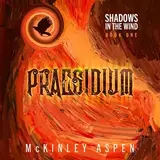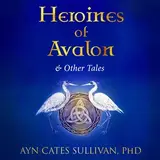

The Island of Doctor Moreau
Narrador: Martina Mercer-Hall
Duración 4h 10m
The Island of Doctor Moreau is an 1896 science fiction novel by English author H. G. Wells. The text of the novel is the narration of Edward Prendick, a shipwrecked man rescued by a passing boat who is left on the island home of Doctor Moreau, a mad scientist who creates human-like hybrid beings from animals via vivisection. The novel deals with a number of philosophical themes, including pain and cruelty, moral responsibility, human identity, and human interference with nature. Wells described it as "an exercise in youthful blasphemy."
The Island of Doctor Moreau is a classic of early science fiction and remains one of Wells' best-known books. The novel is the earliest depiction of the science fiction motif "uplift" in which a more advanced race intervenes in the evolution of an animal species to bring the latter to a higher level of intelligence.
Famous works of the author Herbert Wells: "The Time Machine", "The War of the Worlds", "The War in the Air", "The Island of Dr. Moreau", "The Complete Science Fiction Treasury of H.G. Wells", "The Invisible Man", "When the Sleeper Wakes", "The First Men in the Moon", "The Food of the Gods", "The Magic Shop".
Herbert George Wells, better known as
H.G. Wells, was born on September 21, 1866, in Bromley, England. Often called the "Father of Science Fiction," Wells was not just a writer but a thinker whose imagination shaped the way we dream about the future.
From humble beginnings—his father a shopkeeper and cricketer, his mother a housekeeper—Wells discovered his love for books early on. His curiosity led him to science, studying biology under the legendary T.H. Huxley, who deeply influenced his way of thinking.
Wells's pioneering novels, including The Time Machine (1895), The War of the Worlds (1898), and The Invisible Man (1897), dared readers to imagine a future of possibilities and dangers. His stories were not just thrilling but deeply reflective, exploring themes of human progress, ethics, and the consequences of unchecked power.
But Wells wasn't confined to science fiction. He wrote extensively about history, politics, and society, envisioning world peace and global cooperation long before such ideas gained traction. A social critic and advocate for change, Wells believed in education and equality, ideals woven into his work.
H.G. Wells passed away on August 13, 1946, but his legacy endures. From literature to film, his visions continue to inspire creators and thinkers, proving that the future he imagined still belongs to us all.
Publicado por: Strelbytskyy Multimedia Publishing
Título similares
Ver todosTambién te podría interesar...
Ver todos¿Cómo funciona?
Crear cuenta.
Crea una cuenta gratuita aquí.
Descarga la aplicación Voxa
Disponible para Android y iPhone en Google Play o App Store.
Pruébalo gratis 7 días
Tienes acceso a 200,000 libros y a toda la experiencia Voxa.
Puedes escuchar sin Internet
Descarga tus audiolibros favoritos y disfrútalos incluso sin conexión a Internet.











































